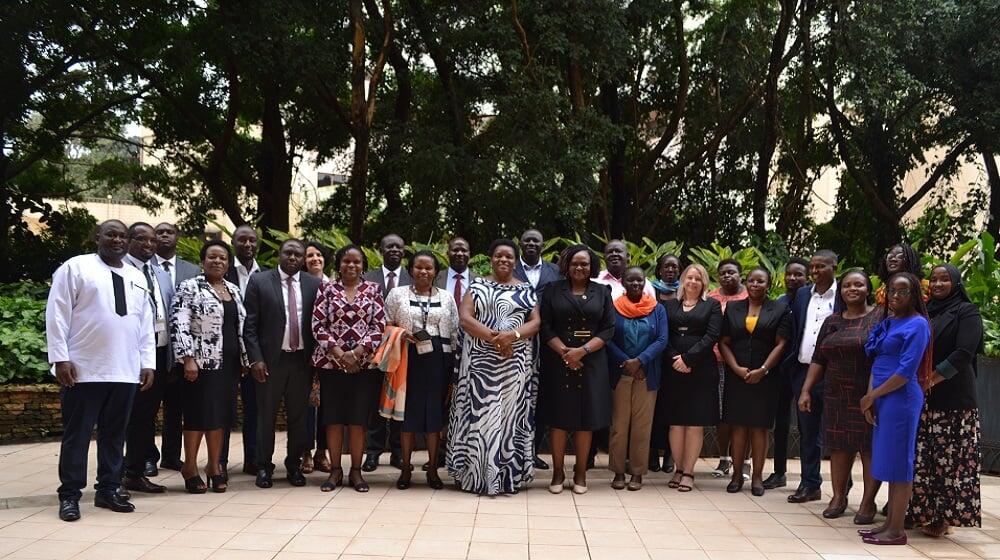KAMPALA: To mark the Zero Tolerance Day to End Female Genital Mutilation (FGM) in Uganda, a high level policy dialogue on accelerating the elimination of the practice has called for strengthened partnerships and innovative financing to eliminate FGM by 2030.
Under the theme: Her Voice, Her Future. Investing in Survivor-Led Movements to End FGM," the policy dialogue that advocated for accelerated investments and reinforcing of a multi-sectoral approach in programming was organized by UNFPA and UNICEF in partnership with the Ministry of Gender, Labor and Social Development under the UN Joint Programme on FGM on February 28, 2024.
To eliminate FGM in Uganda, the dialogue recommended a holistic approach that prioritizes human rights, justice, gender equality, and comprehensive sexuality education to be vital. This requires increased investment, coordinated efforts across sectors and urgent action.
While giving her remarks on behalf of the UN in Uganda, Ms. Gift Malunga, UNFPA Uganda Representative said while progress in FGM abandonment has been realized over the years, persistent harmful norms, fueled by humanitarian crisis like disease outbreaks, climate change and armed conflict, threaten to reverse the hard-won progress made toward gender equality and ending the harmful practice by 2030 which is a target of Sustainable Development Goal 5.3.
“Averting a single case of FGM costs approximately USD 246. Despite the support of the UNFPA-UNICEF Joint Programme on the Elimination of FGM, the Spotlight Initiative 2.0, the Iceland Embassy, and others, our current funding only allows us to protect about 2,000 girls each year. Tragically, this means less than half (approx. 22,000) of the 42,000 Ugandan girls currently at risk will be saved by 2030.
“We need to strengthen partnerships and innovative financing like engaging the private sector. Without a significant increase in resources, and considering the population growth in Uganda, it could take us over five decades to reach every girl in need. Let's remember; each case represents a girl whose life will be forever changed by this harmful practice,” the Representative said.
“The UN stands firm in its commitment to eliminating harmful practices. The UNFPA-UNICEF Joint Programme on the Elimination of FGM is a powerful example of this commitment, bringing our collective expertise to prevent FGM across 17 countries, including Uganda,” Ms. Malunga added.
She said with only seven years remaining in this decade of action, collective actions must be centred around creating environments, where girls and women can exercise their power and choice, enjoying full rights to health, education, and safety.
“Let us amplify survivors' voices, invest in their movements, and create a world where every girl can live free from FGM, exercising her full power and potential,” Ms Malunga said.
In her remark, Sweden’s Ambassador to Uganda, Amb. Maria Hakansson said to accelerate FGM abandonment in practicing communities calls for more awareness raising especially in terms of strengthening communities’ knowledge through messaging on the long-term implications of the practice and reinforcing of the anti-FGM laws. The Ambassador also advocated for innovative financing by exploring alternative funding avenues like the private sector.
“While funding is essential to support efforts addressing FGM, it must be accompanied by sustained commitment, advocacy and cultural change initiatives to achieve lasting progress. Also, we need to be innovative in how we work with the funding already available,” the Envoy said.
Amb. Hakansson said gender equality and women empowerment remain at the heart of Sweden’s foreign policy and reiterated Sweden’s commitment to continue supporting programmes to end GBV including through programmes like the UN Joint Programme on GBV.
“As Sweden, we will continue to fight FGM and reiterate our commitment to continue supporting the programme,” she said.
Chief Guest, Minister of State (Gender and Culture) Hon. Peace Regis Mutuzo said the government of Uganda remains committed to ending FGM and highlighted the importance of multi-sectoral approaches in accelerating elimination and abandonment, including education, mindset change and community sensitization programmes.
“Education coupled with economic empowerment are key to yielding results to ending female genital mutilation” Hon Mutuzo said.
Present were Members of Parliament from FGM-practicing districts, representation from the parliamentary committees on gender, representatives from the Embassies of Iceland, The Netherlands, Norway, UNFPA, UNICEF, CSOs, media, cross cultural foundation and representation from key line ministries.
- Story by Evelyn Matsamura Kiapi


